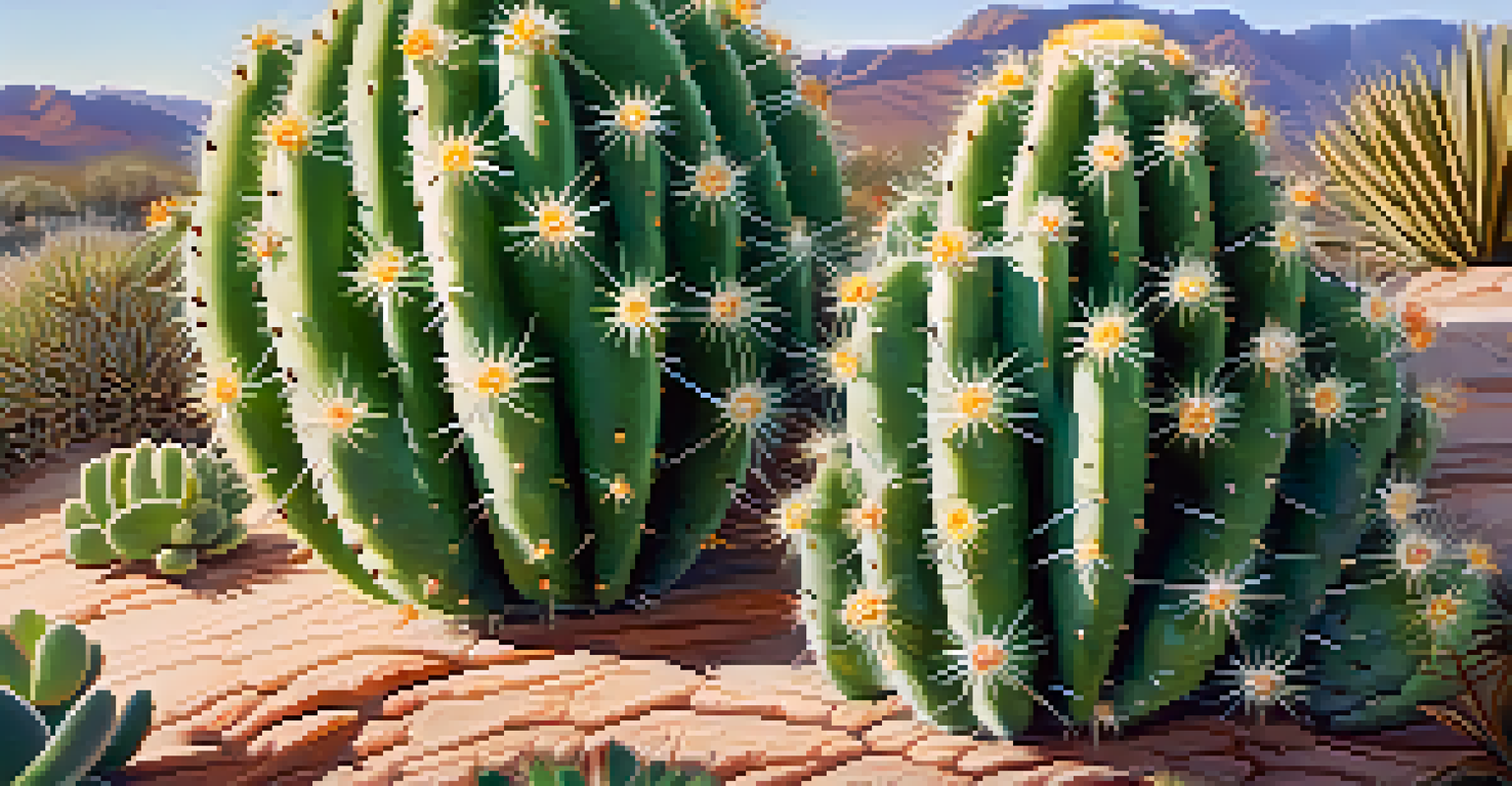Peyote: Gateway to Transcendence and Interconnectedness

Understanding Peyote: A Brief Overview
Peyote is a small, spineless cactus native to Mexico and the southwestern United States. Known scientifically as Lophophora williamsii, this cactus has been used for thousands of years in various spiritual and religious ceremonies. Its psychoactive properties are primarily due to the presence of mescaline, a compound that alters perception and can lead to profound experiences.
The greatest discovery of my generation is that a human being can alter his life by altering his attitude.
Traditionally, indigenous cultures have utilized peyote as a means to connect with the divine and the natural world. It serves as a tool for introspection and healing, often taken during guided rituals. Through these practices, participants seek to transcend their everyday realities and tap into a deeper sense of interconnectedness with all living beings.
As interest in natural psychedelics grows, peyote has gained attention beyond its traditional uses. Modern seekers often look to it as a way to explore consciousness and foster spiritual growth. This resurgence raises important discussions about ethics, sustainability, and the cultural significance of peyote in indigenous communities.
Cultural Significance of Peyote in Indigenous Traditions
For many Native American tribes, peyote is not just a plant; it is considered a sacred medicine. The cactus has a rich history of use in spiritual practices, serving as a bridge between the physical and spiritual worlds. Ceremonies often involve communal gatherings, where participants consume peyote to seek visions and guidance.

The Native American Church, formed in the early 20th century, has been instrumental in preserving the ritualistic use of peyote. This organization has fought legal battles to protect the rights of its members to use peyote in their spiritual practices. In this context, peyote symbolizes resilience and cultural identity, deeply woven into the fabric of their beliefs.
Peyote's Spiritual and Cultural Role
Peyote serves as a sacred medicine for many indigenous cultures, facilitating spiritual connection and communal experiences.
By participating in these ceremonies, individuals often report feelings of unity and belonging, not just with their community but with nature and the universe. This shared experience fosters a sense of collective consciousness, emphasizing the importance of interconnectedness in all aspects of life.
The Experience of Taking Peyote: Insights and Revelations
Consuming peyote can lead to a variety of experiences, ranging from visual hallucinations to profound emotional insights. Many users report a sense of clarity, with feelings of love and interconnectedness often emerging during the journey. These revelations can provide a fresh perspective on personal struggles and the world at large.
Nature does not hurry, yet everything is accomplished.
The effects of peyote typically begin within an hour of consumption and can last for several hours. During this time, individuals may encounter intense emotions, memories, and even a feeling of communion with nature. This journey often requires a safe, supportive environment to facilitate the process and allow for meaningful introspection.
It's important to approach the peyote experience with respect and intention. By preparing oneself mentally and spiritually, individuals can maximize the potential for understanding and healing. This transformative journey often leaves participants with a renewed sense of purpose and a deeper appreciation for life.
Psychedelics and Modern Science: Exploring the Benefits
In recent years, the scientific community has begun to explore the therapeutic benefits of psychedelics, including peyote. Research suggests that psychedelics can help treat various mental health conditions, such as depression, anxiety, and PTSD. These findings have sparked renewed interest in traditional medicines and their potential applications in modern therapy.
Studies indicate that the use of psychedelics can lead to significant improvements in emotional well-being and life satisfaction. Participants often report lasting changes in mindset and behavior following their experiences. This has prompted a reevaluation of how we view psychedelics, moving beyond stigma to recognize their potential for healing.
Therapeutic Benefits of Peyote
Recent research highlights peyote's potential in treating mental health conditions, bridging traditional practices with modern science.
By integrating traditional practices with modern science, we can create a holistic approach to mental health care. Understanding the mechanisms behind peyote's effects can help bridge the gap between ancient wisdom and contemporary therapeutic practices, ultimately benefiting countless individuals seeking healing.
Ethical Considerations in Peyote Use and Sustainability
As interest in peyote grows, so do concerns about its sustainability and ethical use. Overharvesting and habitat destruction pose significant threats to the cactus, which can take years to mature. This has led to calls for responsible sourcing and cultivation practices to ensure that peyote remains available for future generations.
Moreover, as more people seek peyote for personal exploration, it's crucial to respect its cultural significance. Engaging with indigenous communities and understanding their perspectives can foster a more ethical approach to using peyote. This involves acknowledging their rights and traditions while promoting the conservation of this sacred plant.
Creating a dialogue about the responsible use of peyote encourages a more respectful and sustainable relationship with nature. By prioritizing ethical practices, we can ensure that peyote remains a viable resource for both spiritual seekers and indigenous cultures.
Personal Stories: Transformative Journeys with Peyote
Many individuals share powerful stories of their experiences with peyote, highlighting its transformative potential. For some, a single journey can lead to profound insights about their life’s purpose, relationships, and overall well-being. These narratives often illustrate the deep emotional and spiritual impacts that peyote can have.
One common theme among these stories is the sense of interconnectedness felt during the experience. Participants often describe feeling a part of something greater than themselves, leading to a lasting change in perspective. This newfound awareness can inspire individuals to make positive changes in their lives and contribute to their communities.
Ethics and Sustainability Concerns
The growing interest in peyote raises important ethical and sustainability issues, emphasizing the need for responsible use and respect for indigenous traditions.
These personal testimonials serve as a testament to the power of peyote as a catalyst for growth and healing. They remind us of the potential for transformative experiences when we approach substances with respect and intention, fostering a deeper understanding of ourselves and the world around us.
Looking Ahead: The Future of Peyote in Spiritual Practice
As we move forward, the future of peyote in spiritual practices will likely continue to evolve. With increasing interest in psychedelics, there’s a growing need for education about their cultural significance and responsible use. This shift can help ensure that peyote is treated with the reverence it deserves, allowing it to thrive in both traditional and modern contexts.
The integration of peyote into contemporary wellness practices may also lead to new insights and applications. By combining ancient wisdom with modern therapeutic practices, individuals can explore the depths of their consciousness while honoring the traditions that have come before. This approach could pave the way for a more holistic understanding of mental health.

Ultimately, the journey with peyote is not just about personal transformation; it’s also about fostering a connection to the earth and each other. As we navigate this path, embracing the lessons learned from peyote can help us build a more compassionate and interconnected world.